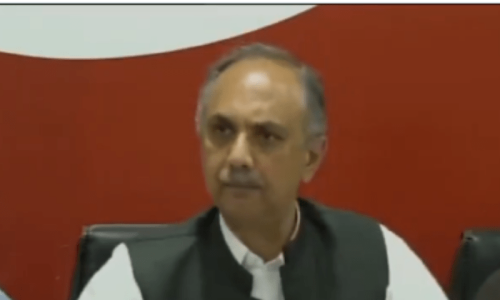ISLAMABAD: In line with an agreement with the International Monetary Fund, the Ministry of Energy has proposed up to 200 per cent increase in natural gas tariff for domestic consumers and on average 31pc for all other categories to generate about Rs510 billion next fiscal year.
The “revision in gas sale prices would generate total revenue of Rs508bn, thus meeting the entire revenue requirements of Rs487bn for FY 2019-20 as well as recoup Rs21bn towards stock of circular debt”, said the petroleum division of the energy ministry in its summary to the Economic Coordination Committee (ECC) of the cabinet.
The revised gas prices are required by law to become effective on July 1 and Jan 1 every year.
The ministry has also recommended changing the billing mechanism to allow the benefit of one previous slab to domestic consumers (residential use) in line with practice being followed for electricity consumers.
The domestic slabs have also been rearranged by bringing down the size of the highest slab to 400 cubic meters per month instead of 500 cubic meters.
Summary for gas price hike by petroleum division sent to Economic Coordination Committee
According to the summary, the tariff for consumers using less than 50 cubic meters will remain unchanged at Rs121 per million British thermal unit (MMBTU) and its monthly bill will also remain so at Rs285.
The price for second slab (up to 100 cubic meters) is proposed to be increased by almost 190pc to Rs369 per unit, from Rs127 per unit at present. The bill of this slab is estimated to go up by Rs361 or 63pc to Rs933 per month from Rs572.
The tariff for third slab (up to 200 cubic meters) will witness an increase of 102pc to Rs533per unit from Rs264 while this consumption would result in a monthly bill of Rs3,872, up by 68pc from Rs2,305 per unit.
The price for fourth slab (up to 300 cubic meters) has been proposed to be increased by Rs168pc to Rs738per unit form the existing rate of Rs275. The monthly bill of this category is estimated to go up by 122pc or Rs4,406 to Rs7,995 from Rs3,589.
The gas rate for fifth slab of 400 cubic meters will increase by about 42pc to Rs1,107 per unit from Rs780 which is precisely the average unit cost of gas supply. The bill for this category will increase by about 6.4pc to Rs14,373 per month from Rs13,508 because of the previous slab benefit.
The sixth slab price of above 400 cubic meters will be charged at Rs1,476 per unit instead of its existing rate of Rs1,460. The slab benefit will, however, reduce its monthly bill to Rs25,534 from the existing Rs31,573, down by Rs6,039 or about 19pc.
The energy ministry has proposed that the rate for bulk domestic consumers may remain unchanged at Rs780 per unit. Monthly bill for special commercial consumers (Roti Tandoors) with consumption up to 300 cubic meters will be as per domestic slab but entire consumption above this level would be charged at commercial tariff of Rs1,283 per unit.
The summary also suggests 62pc increase in feedstock for old fertiliser to Rs300 per unit from Rs185. It proposes 31pc increase for all other categories. As such, the gas rate for power plants will go up to Rs824 per unit from Rs629 while the rate for cement plants will touch Rs1,277 per unit instead of Rs975.
Likewise, the gas rates for general industry (other than zero rated in Punjab) and captive plants will go up from Rs780per unit to Rs1,021. The rate for zero rated industry is also proposed to go up from Rs600 at present to Rs786 per unit while rates for CNG and commercial consumers will increase to Rs1,283 per unit instead from Rs980.
The summary says the zero rated industry in Punjab will be charged the mix of natural gas and RLNG at weighted average tariff of $6.5 per MMBTU provided the government approves the subsidy, otherwise they will be charged at the notified tariff of gas and RLNG against their actual consumption.
The ministry said the Oil and Gas Regulatory Authority had determined on May 17 the estimated revenue requirement of Rs293.3bn for the Sui Northern Gas Pipelines Limited (SNGPL) and Rs270.78bn for the Sui Southern Gas Company Limited (SSGCL) for FY2019-20.
As such, a net revenue requirement after adjusting other income of the SNGPL has been worked out at Rs277.9bn and that of the SSGCL at Rs263.25bn.
At current gas sale prices, the ministry said, the SNGPL would face a net revenue shortfall of Rs87.63bn while the SSGCL would have to bear Rs56.80bn shortfall.
“To meet the projected shortfall, Ogra has recommended category wise prescribed prices to be made effective from July 1, 2019. The Ogra has recommended 31pc and 20pc across the board increase in gas sale prices for all categories of SNGPL and SSGCL respectively, except domestic sector,” noted the summary to the ECC.
For domestic consumers, the Ogra has suggested increase based on an approach towards “rationalisation of domestic tariff based on indexation of each slab tariff with weighted average prescribed price” (cost of supply). However, the ministry argued that since the government was following a policy of uniform gas sale price across the country, it will be expedient to benchmark the decision making SNGPL revenue requirements for all consumers across the country.
Published in Dawn, June 26th, 2019
















































Dear visitor, the comments section is undergoing an overhaul and will return soon.